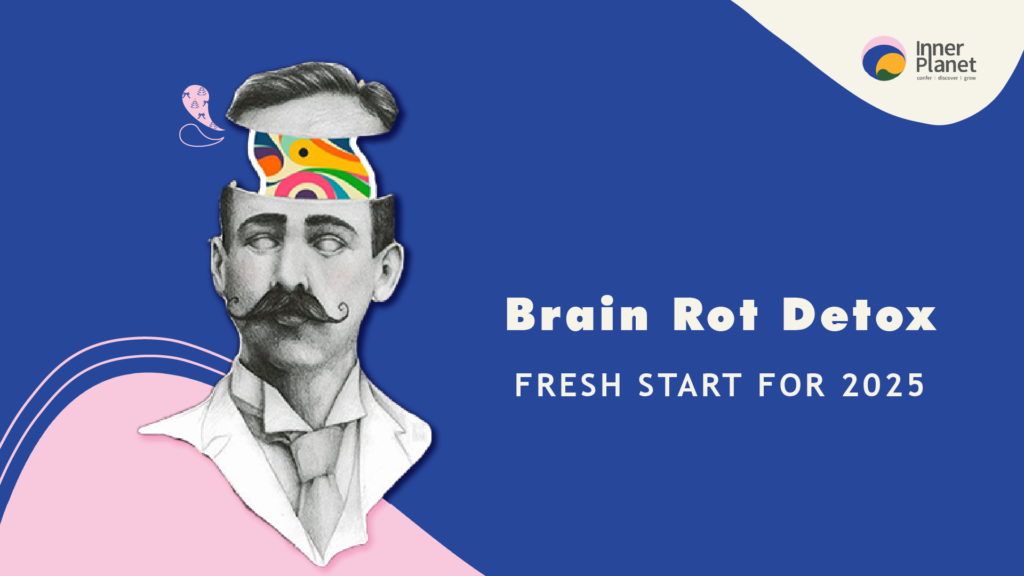Brain rot—a term that vividly describes the mental wear and tear caused by excessive digital consumption—has become a pressing challenge in our hyperconnected world. Whether it’s multitasking, constant notifications, or endless scrolling, the effects are undeniable: reduced focus, mental fatigue, and shallow thinking. But here’s the good news: while brain rot is a reality for many, it’s not a permanent condition. This blog explores the components of brain rot—cognitive overload, digital fatigue, dopamine dysregulation, and neuroplasticity decline—and offers possible strategies to navigate these challenges.
1. Cognitive Overload: Causes and Possibilities
The Problem
Cognitive overload happens when the brain is bombarded with more information than it can process. From multitasking to hypermedia, modern digital environments strain our mental capacity, leaving little room for deep thought or retention.
- Impact:
- Shallow learning and poor memory retention.
- Difficulty distinguishing relevant information from distractions.
- Impaired focus and decision-making.
A Way Out
Consider trying these strategies to alleviate cognitive overload:
- Limit Multitasking: Focusing on one task at a time may help improve efficiency and reduce mental strain. Tools like the Pomodoro Method can offer structure.
- Filter Your Information Intake: Choosing fewer, high-value sources of information might make it easier to stay focused and avoid distraction.
- Create a Focus-Friendly Space: Apps like Freedom can block distracting sites, but a simple shift—like turning off notifications—could also make a difference.
2. Digital Fatigue: Symptoms and Potential Relief
The Problem
Digital fatigue—a type of mental and physical exhaustion caused by screen overuse—is a hallmark of brain rot. It affects everything from productivity to emotional well-being.
- Symptoms:
- Eye strain, headaches, and disrupted sleep.
- Reduced attention span and irritability.
- A persistent sense of exhaustion.
A Way Out
Here are some ideas to explore if you’re experiencing digital fatigue:
- Take Regular Breaks: Practices like the 20-20-20 rule (looking 20 feet away for 20 seconds every 20 minutes) might ease eye strain.
- Use Blue Light Filters: Enabling night mode or trying apps like f.lux could improve sleep quality.
- Plan Digital Detoxes: Stepping away from screens for dedicated periods each day—whether it’s a walk, a hobby, or family time—might help you recharge.
You don’t have to go all-in on these ideas. Start small and adapt as you find what works best for you.
3. Dopamine Dysregulation: Understanding and Options
The Problem
Social media likes, gaming wins, and notifications provide short bursts of dopamine, conditioning the brain to seek instant gratification. Over time, this can diminish motivation for longer-term goals.
- Impact:
- A preference for low-effort tasks.
- Difficulty sustaining focus or enjoying delayed rewards.
- Compulsive checking of devices.
A Way Out
Here are some ways to reset your brain’s reward system:
- Restructure Rewards: Trying to replace instant hits with meaningful achievements, like completing a challenging project or enjoying a new hobby, might help.
- Practice Gratitude: Reflecting on accomplishments—big or small—can encourage intrinsic motivation.
- Turn Off Notifications: Silencing non-essential alerts could reduce the constant pull for attention.
You might find that just one of these changes makes a difference, or you may combine them over time.
4. Neuroplasticity Decline: Causes and Opportunities
The Problem
Neuroplasticity, the brain’s ability to adapt and form new connections, can decline due to repetitive, unstimulating digital habits. Over time, this might lead to a loss of creativity, adaptability, and problem-solving skills.
- Causes:
- Over-reliance on passive content consumption.
- Lack of mentally engaging activities.
A Way Out
To support neuroplasticity, consider trying these approaches:
- Engage in Active Learning: Whether it’s learning an instrument, solving puzzles, or taking up a new skill, these activities might help your brain stay adaptable.
- Exercise Regularly: Physical activities like running, yoga, or strength training could improve both cognitive and physical resilience.
- Limit Passive Consumption: Shifting from passive scrolling to intentional activities—like reading a book or engaging in a creative hobby—might make a noticeable difference.
5. Reclaiming Your Brain—A Holistic Approach
As you reflect on these possibilities, consider how they might come together in your daily routine. Mindfulness, intentional technology use, and meaningful offline activities can complement each other to help you navigate brain rot more effectively.
Here are a few integrated practices:
- Mindfulness Exercises: Daily meditation or short breathing exercises might improve focus and reduce stress.
- Offline Time: Carving out moments for activities like walking, journaling, or having a conversation can refresh your mind.
- Digital Boundaries: Establishing clear rules for screen use—like no devices at meals or in the bedroom—could support your overall well-being.
It’s all about finding a balance that works for you.
Brain rot might feel overwhelming, but it doesn’t have to define your mental health or productivity. The strategies outlined here—tailored to address the various aspects of brain rot—are starting points, not mandates. Try what feels manageable, adapt as needed, and most importantly, give yourself the space for all the trails that end in errors. Every small step you take brings you closer to a clearer, more focused mind! This can understandably be a challenging goal to accomplish independently. You can always reach out to professionals, like us, to help accelerate this process, and develop clarity!
References
- Carr, N. (2020). The shallows: What the internet is doing to our brains (Updated ed.). W. W. Norton & Company.
- Newport, C. (2019). Digital minimalism: Choosing a focused life in a noisy world. Portfolio.
- Twenge, J. M. (2017). iGen: Why today’s super-connected kids are growing up less rebellious, more tolerant, less happy—and completely unprepared for adulthood. Atria Books.
- Gazzaley, A., & Rosen, L. D. (2016). The distracted mind: Ancient brains in a high-tech world. MIT Press.
Turkle, S. (2015).Reclaiming conversation: The power of talk in a digital age. Penguin Press.


